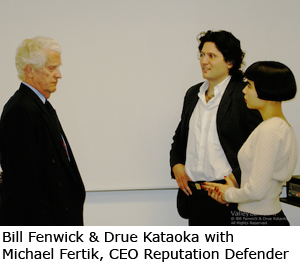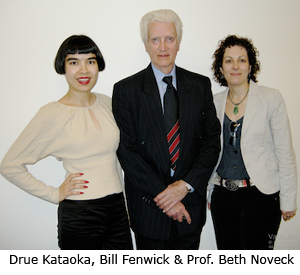Reputation 2.0

On Tuesday April 22nd ValleyZen was invited to observe “The First Amendment in the Digital Age,” a Stanford seminar by Beth Noveck. She is a Professor of Law and the Director of the Institute for Information Law & Policy at New York Law School. Noveck teaches in the areas of intellectual property and innovation law and policy, constitutional law, e-democracy and e-government. The topic for this week concerned the development and use of impenetrable anonymizing software which makes it impossible to identify the source of a posting on the Internet. The class discussed the effects on the constitutional rights of freedom of press and individuals’ right of privacy. The guest presenter was Michael Fertik, CEO of Reputation Defender. His company offers, for a fee, assistance to persons if they find themselves in the disastrous situation like the one he discussed in the seminar.
Tor (anonymizing Internet software) is available on the Web. It carries out posting without being traceable to any IP number. Mr. Fertik described the result of combining Tor with a federal law giving “Protection for private blocking and screening of offensive material.” The software and the federal statute makes possible false and defamatory posts which threaten, degrade, and harass without risk of detection.

Two, young post-graduate students are currently suffering irreparable injury to their reputations and future prospects by someone’s use of Tor. Because of the inability to identify the IP number of the perpetrator’s computer[s] and the federal statutory immunity given to:
“any person or entity that is responsible, in whole or in part, for the creation or development of information provided through the Internet or any other interactive computer service”
the court is unable to stop the outrageous activity. Anonymity is important to free speech and press as was established by Thomas Paine’s Common Sense Pamphlets. However, add use of Tor on the Internet and it unbalances the current compromise between individual rights and freedom of the press. Now a combination of sophisticated technologies and the federal statute is destroying the right to privacy and the right to feel secure in our civil society.
A dialogue about how enabling developments in information technology may require adjustments to social and constitutional policies dealing with privacy and freedom of press and speech is in the spirit of Zen and in the best interest of the high tech community.
It appears to us that this is an intersection of Zen, the Valley and High Tech that deserves an effort by all to assist in adjusting the imbalances that occur because of a technological enablement that may otherwise call forth some very unattractive solutions. Mr. Fertik believes some minor changes in the federal statute will resolve this and similar future dilemmas. ValleyZen also believes there are information technology solutions that can achieve the same result without undue restriction on the Internet.
It should be noted that Mr. Fertik’s company with the able assistance of Professor Mark Lemley and Keker & Van Nest, LLP, on a pro bono basis, is attempting to get a resolution of the unjust treatment of the post graduate students and relieve them of this nightmare.
What are you thoughts about future challenges that will be posed by technological developments to individual constitutional rights and appropriate approaches to solutions?

Bill Fenwick & Drue Kataoka



What is missing is that ReputationDefender presumably uses black-hat SEO techniques usually associated with spammers to achieve the goals of their clients (presumably proxy hijackings, triggering of spam filters through link farms and content duplicatons, etc).
Clearly the current situation of free-for-all is a problem. But ReputationDefender-style techniques are not, in my view, the solution. First, I question their long-term effectiveness: there is no guarantee that the results that they provide will stay after a few major Google algo updates. Secondly, this solution is not scalable: we cannot get everybody to subscribe to ReputationDefender and its competitors.
The real solution can come in one of two ways:
1. Regulatory approach: limiting free speech, particularly defamatory speech
2. Change in attitudes: people need to adjust their perception that everything they read on an anonymous source on the web is “the truth and nothing but the truth”.
The trouble, though, is that (1) is highly undesirable, and (2) takes time. I guess in the interim, ReputationDefender and its brethren are the smallest of all possible evils, after all.